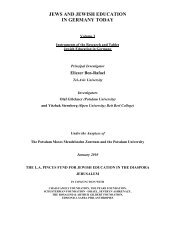jews and jewish education in germany today - The Westbury Group
jews and jewish education in germany today - The Westbury Group
jews and jewish education in germany today - The Westbury Group
Create successful ePaper yourself
Turn your PDF publications into a flip-book with our unique Google optimized e-Paper software.
● <strong>The</strong>re was an overall survey <strong>in</strong> the Jewish Community <strong>in</strong> Berl<strong>in</strong> whose results were published <strong>in</strong> the<br />
Community journal ‘Jüdisches Berl<strong>in</strong>’ <strong>in</strong> 2003. Accord<strong>in</strong>g to the survey, 52% of the respondents considered<br />
the JC primarily as a place for religious ceremonies, whereas the other respondents valued th<strong>in</strong>gs like social<br />
<strong>and</strong> enterta<strong>in</strong>ment activities. Do you see a problem <strong>in</strong> this constellation of religious <strong>and</strong> non-religious<br />
<strong>in</strong>terests?<br />
If I look at the figures, I would assume the <strong>in</strong>terest of 52% of the immigrants <strong>in</strong> religious issues is highly<br />
exaggerated. About four years ago the number of Bar <strong>and</strong> Bat Mitzvahs that were held <strong>in</strong> the Jewish<br />
Community of was so low that only a quarter of the kids eligible actually had a Bar or Bat Mitzvah. S<strong>in</strong>ce<br />
more engag<strong>in</strong>g rabbis took office <strong>in</strong> Berl<strong>in</strong> this figure is ris<strong>in</strong>g currently.<br />
● A quarter of the registered members?<br />
Yes. That’s very low. <strong>The</strong>refore 52% with religious <strong>in</strong>terests seems to me to be completely exaggerated. I<br />
would say the share of religious <strong>in</strong>terests is probably 12-20%. But then, what does religious <strong>in</strong>terest mean? I<br />
th<strong>in</strong>k my experience of the debate of the denom<strong>in</strong>ationalism <strong>in</strong> Judaism <strong>in</strong> the last 15 years has shown that<br />
people, especially Jewish people, don’t identify themselves by say<strong>in</strong>g, I’m a faithful Jew. <strong>The</strong>y identify<br />
themselves culturally. Our attempt should be to say to the FSU immigrants, for example, Passover is exactly<br />
your experience. You went out of Egypt <strong>in</strong>to a new country, <strong>and</strong> now you have positive <strong>and</strong> negative<br />
experiences.<br />
By study<strong>in</strong>g the tradition of the Rabbis, one can create a dedication <strong>in</strong> these people to say you know, this<br />
experience of transience <strong>and</strong> of uncerta<strong>in</strong>ty <strong>and</strong> of redef<strong>in</strong>ition is a Jewish experience.<br />
<strong>The</strong>n there is also more room to use other forms that can be employed when establish<strong>in</strong>g a dialogue with<br />
other religions. But if you are absolutely unable to express yourself <strong>in</strong> Jewish terms, because you have not<br />
acquired the necessary language for this, I th<strong>in</strong>k most people would say I’m not <strong>in</strong> touch with my Jewish<br />
tradition. I th<strong>in</strong>k that Judaism does not expect an expression of faith, say<strong>in</strong>g I have a personal relationship<br />
with God. <strong>The</strong> urgent question is whether you live your life accord<strong>in</strong>g to the three dimensions that are on<br />
offer which are social action, Torah study, <strong>and</strong> prayer. Certa<strong>in</strong>ly the social action aspect, especially <strong>in</strong> youth<br />
work can be a very powerful mode of change <strong>and</strong> of creat<strong>in</strong>g loyalty to the Jewish people.<br />
You can always study even if you don’t believe <strong>in</strong> God; you can still be <strong>in</strong>terested <strong>in</strong> the Jewish tradition <strong>and</strong><br />
can study Jewish texts. At the University <strong>in</strong> Potsdam we have 400 non-Jewish students who study Judaism.<br />
So obviously there must be someth<strong>in</strong>g <strong>in</strong> it.<br />
<strong>The</strong>n there is the third aspect, that of prayer, that of course can also build on the youth experiences. I f<strong>in</strong>d it to<br />
be an <strong>in</strong>terest<strong>in</strong>g observation that <strong>in</strong> youth work one <strong>in</strong>stills <strong>in</strong>terest <strong>in</strong> the spiritual side through night walks,<br />
sensitivity, or guitar play<strong>in</strong>g at the lake; whereas you actually need to enable a knowledge of other<br />
dimensions that make you more literate <strong>in</strong> express<strong>in</strong>g yourself <strong>in</strong> religious terms. If you have no literacy for<br />
these dimensions you cannot expect that people will use or even underst<strong>and</strong> this language. It’s someth<strong>in</strong>g that<br />
you have to get used to. In our discussion we have built a k<strong>in</strong>d of modular prototype of how one can go about<br />
help<strong>in</strong>g the current calamity, <strong>and</strong> therefore I would say the bad news is that we have only 20% who are<br />
actually express<strong>in</strong>g a religious <strong>in</strong>terest. We have perhaps only 3% who will rema<strong>in</strong> <strong>in</strong> the communities if we<br />
don’t do anyth<strong>in</strong>g substantial with<strong>in</strong> the next 10-20 years. Given the fact of how much money the German<br />
government has pumped <strong>in</strong>to immigration <strong>and</strong> <strong>in</strong>tegration, we will have lost millions <strong>and</strong> millions <strong>and</strong><br />
millions of euros for a small percentage of Jews that have actually stayed <strong>in</strong> Germany. If we carry on the way<br />
we are now, <strong>in</strong> 10 years time, we might have as many Jews left as we had <strong>in</strong> 1989.<br />
● That would be horrible.<br />
It would be <strong>in</strong>deed, <strong>and</strong> we can only change this with a structured approach to youth work <strong>in</strong> the way that I<br />
described. <strong>The</strong> trouble is that any activity has to be almost totally f<strong>in</strong>anced by the organizations because there<br />
is very little that these people are will<strong>in</strong>g or able to contribute.<br />
74 | P a g e



